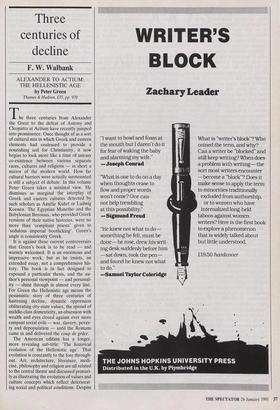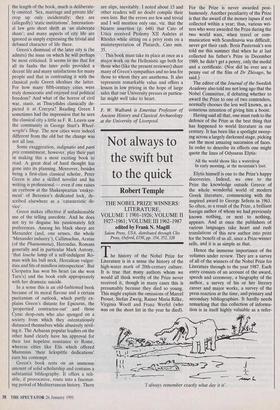Three centuries of decline
F. W. Walbank
ALEXANDER TO ACTIUM: THE HELLENISTIC AGE by Peter Green
Thames & Hudson, £35, pp. 970
The three centuries from Alexander the Great to the defeat of Antony and Cleopatra at Actium have recently jumped into prominence. Once thought of as a sort of cultural mix in which Greek and eastern elements had coalesced to provide a nourishing soil for Christianity, it now begins to look more like a time of uneasy co-existence between various separate races, cultures and religions — in short a mirror of the modern world. How far cultural barriers were actually surmounted is still a subject of debate. In this volume Peter Green takes a minimal view. He dismisses as marginal the interplay of Greek and eastern cultures detected by such scholars as Arnelie Kuhrt or Ludwig Koenen. The Egyptian Manetho and the Babylonian Berossus, who provided Greek versions of their native histories, were no more than 'compliant priests' given to `sedulous imperial bootlicking'. Green's angle is consistently Greek.
It is against these current controversies that Green's book is to be read — and warmly welcomed. It is an enormous and impressive work, but as he insists, an extended essay, not a comprehensive his- tory. The book is in fact designed to expound a particular thesis, and the au- thor's personal viewpoint — and personal- ity — shine through in almost every line. For Green the Hellenistic age means the pessimistic story of three centuries of hastening decline, dynastic oppression obliterating city-state values, the spread of middle-class domesticity, an obsession with wealth and eyes closed against ever more rampant social evils — war, slavery, pover- ty and depopulation — until the Romans came in and delivered the coup de grace.
The American edition has a longer, more revealing sub-title: 'The historical evolution of the Hellenistic age'. That evolution is constantly to the fore through- out. Art, architecture, literature, medi- cine, philosophy and religion are all related to the central theme and discussed primari- ly as illustrating the evolution of values and culture concepts which reflect deteriorat- ing social and political conditions. Despite the length of the book, much is deliberate- ly omitted. 'Sex, marriage and private life' crop up only incidentally: they are (allegedly) 'static institutions'. Internation- al law gets short shrift as 'an elaborate sham'; and many aspects of city life are ignored as simply expressing the trivial and debased character of life there.
Green's dismissal of the later city is (he admits) the issue on which he will perhaps be most criticised. It seems to me that for all its faults the later polls provided a decent life and many satisfactions for many people and that in contrasting it with the classical polls Green idealises the latter. For how many fifth-century cities were truly democratic and enjoyed real political freedom? And what of the horror of civil war, stasis, as Thucydides classically de picted it at Corcyra? Reading Green I sometimes had the impression that he sees the classical city a little as F. R. Leavis saw the community in George Stuffs Wheel- wright's Shop. The new cities were indeed different from the old but the change was not all loss.
Some exaggeration, indignatio and parti pris commitment, however, play their part in making this a most exciting book to read. A great deal of hard thought has gone into its planning. Moreover, besides being a first-class classical scholar, Peter Green is also a skilled novelist and his writing is professional — even if one raises an eyebrow at the Shakespearian `enskye- mem' of Berenice's dedicated lock, de- scribed elsewhere as a `catasteristic de- vice'.
Green makes effective if unfashionable use of the telling anecdote. And he does not try to disguise his passionately felt preferences. Among his black sheep are Menander (and, one senses, the whole `Menander industry'), Callimachus, Aratus (of the Phaenomena), Herondas, Romans generally and in particular Mark Antony, `that louche lump of a self-indulgent Ro- man with his bull neck, Herculean vulgar- ities and fits of mindless introspection'. But Cleopatra has won his heart (as she won Tarn's) and the book ends appropriately with her dramatic suicide.
In a sense this is an old-fashioned book because of its moral flavour and a certain puritanism of outlook, which partly ex- plains Green's distaste for Epicurus, the `propertied contractor-out' and those Cynic drop-outs who also sponged on a society from which they ostentatiously distanced themselves while abusively revil- ing it. The Achaean popular leaders on the other hand clearly have his approval for their last hopeless resistance to Rome, whereas cities like Elis which offered Mummius 'their lickspittle dedications' earn his contempt.
Green's book rests on an immense amount of solid scholarship and contains a substantial bibliography. It offers a reli- able, if provocative, route into a fascinat- ing period of Mediterranean history. There are slips, inevitably. I noted about 15 and other readers will no doubt compile their own lists. But the errors are few and trivial and I will mention only one, viz. that the bizarre assertion (p. 648) that Cato of Utica received Ptolemy XII Auletes at Rhodes while sitting on a privy rests on a misinterpretation of Plutarch, Cato min. 35.
This book must take its place at once as a major work on the Hellenistic age both for those who (like the present reviewer) share many of Green's sympathies and no less for those to whom they are anathema. It also represents remarkable value and offers a lesson in low pricing in the hope of large sales that our University presses in particu- lar might well take to heart.
F. W. Walbank is Emeritus Professor of Ancient History and Classical Archaeology at the University of Liverpool.



























































 Previous page
Previous page